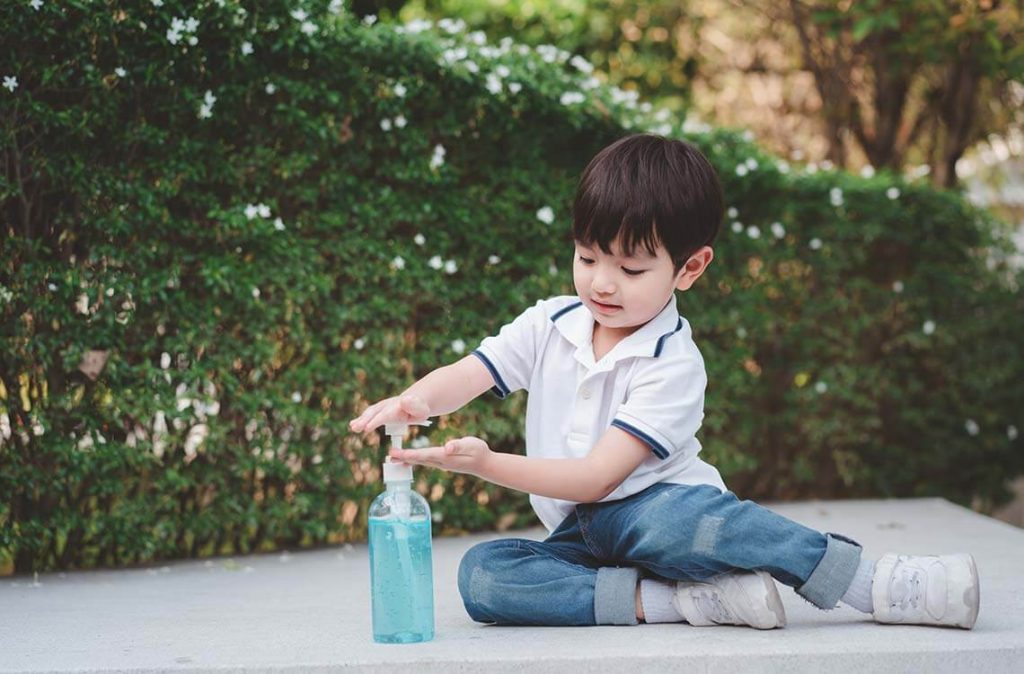Do you want to know the secret to keeping your children safe from the very thing that’s supposed to protect them? Even as people are slowly getting used to living with COVID-19, hand sanitisers continue to be a popular commodity among Malaysians. Most of us may squirt those strong-smelling and typically alcohol-laced gels onto our palms any chance we get. For some, they may habitually do so even in the comfort of their homes and up to 10 to 15 times a day! Yes, alcohol is effective in destroying germs, even viruses. But some of your favourite alcohol-based hand sanitisers may actually be doing some harm to your long-term health. Here are some facts you need to know.
They Are Not Food Safe
Many of us may use sanitisers as the first line of protection against germs. But what happens when the thing that’s meant to protect us becomes the very thing that endangers our lives and the lives of our loved ones? Many disinfectant sprays and aerosol hand sanitisers contain harmful ingredients like methanol, isopropyl alcohol, polyethylene glycol (PEGs), fragrance, stabilisers, preservatives and other non-safe compounds. If you happen to accidentally use sanitisers near food, these chemicals can cause poisoning and other unpleasant reactions when consumed. There is also the risk of alcohol poisoning, especially among children. As a parent, you may want to do everything in your power to prevent this from happening to your own kids.
They Compromise Your Skin
Alcohol is generally great at killing germs, but overuse can be harmful, which many people tend to do as a result of COVID-scare. Alcohol-based sanitisers can be especially harsh for those with sensitive or dry skin. And it may actually make you more vulnerable to infections in the future as alcohol compromises and breaks down your skin barrier. You may experience some excessive dryness, irritation, and even peeling in the area around your hands. Now, you might be thinking, “But I can still use alcohol sanitisers on surfaces, right?”. Well, that depends as well. Alcohol is still flammable, so using it on surfaces still poses significant risk especially if there are any sources of fire nearby that you may not be aware of. This is why most commercial disinfectants are alcohol-free, especially those used in kitchens and restaurants.
They May Not Be as Effective as You Think
As much as we may love our alcohol sanitisers, do you ever wonder if they’re truly keeping you safe? This actually depends on the alcohol content. The ideal alcohol content should be between 60% to 80% in order to properly sanitise and disinfect. But even then, you may run into another problem. Depending on the content, alcohol ideally needs to coat a surface for several seconds. This is known as contact time, which is the length of time a disinfectant must remain wet on a surface in order to successfully destroy pathogens. A sanitiser with 75% alcohol content, for instance, will require at least 15 seconds of contact time to properly destroy viral cells. But because alcohol evaporates so fast, it may not have enough time to do its job.
They Increase Antimicrobial Resistance
Finally, while they may help get rid of viruses, they may end up making certain bacterial strains stronger. While often lumped together as ‘germs’, viruses and bacteria are completely different things. It’s much harder for viruses to develop resistance, whereas bacteria can ‘evolve’ and adapt to their environment much quicker. One study found that certain strains of bacteria have become tolerant to alcohol washes. This means they can survive longer contact time with alcohol, specifically 70% isopropyl. So, while we’re battling COVID-19 with our alcohol sanitisers, we may end up accidentally creating a superbug that may be much harder to get rid of—yikes!
They Don’t Offer Long-Term Protection
Alcohol-based sanitisers are a one-time deal. With the right alcohol content and sufficient contact time, they may have the power to kill germs effectively, including viruses. But the next time you go out, you’ll still be exposed to pathogens. Sanitisers offer very little protection against viruses. Not unless they have very special ingredients. So, be sure to read the label on the back of the product before you purchase any bottle of sanitiser. The wrong one may end up doing more harm than good.
Now, here comes the good news. A sanitiser that is effective in offering long-term virus protection yet alcohol-free and skin-friendly, does in fact exist!
Introducing Asylea 24 Hours-Protection MaxSafe Plus Disinfectant
Looking for a multi-purpose alcohol-free, skin-friendly sanitiser with a 99.999% disinfection rate? Well, look no further than Asylea 24 Hours-Protection MaxSafe Plus Disinfectant! Formulated with HONa, a revolutionary formula derived from hypochlorous acid, this sanitiser provides all-day protection against viruses and pathogens without compromising your skin health or your long-term well-being.
You can even use it on tableware and utensils, because it’s also food grade safe! So even if you happened to get some in your food, you won’t have to worry. Making it 100% safe for children and pregnant women.
Clinically proven with an impressive 1-second contact time, it instantly deactivates all pathogens on a surface. It’s also non-toxic, non-sticky, rinse-free, and does not have a pungent smell.
Get Asylea 24 Hours-Protection MaxSafe Plus Disinfectant
It’s time to try Asylea’s alcohol-free, skin-friendly, non-toxic, food grade disinfectant that will work 15 times more effective at killing germs and viruses. Just one second of being exposed to Asylea 24 Hours-Protection MaxSafe Plus Disinfectant and poof! All those nasty disease-causing pathogens are gone. So, what are you waiting for?
Buy your Asylea 24 Hours-Protection MaxSafe Plus Disinfectant on Shopee now before stocks run out. You won’t regret it.
Disclaimer: The information provided in this article is for informational purposes only and should not be considered as medical advice from Motherhood. For any health-related concerns, it is advisable to consult with a qualified healthcare professional or medical practitioner.
For more insightful stories and fun recipes, stay tuned to Motherhood Story!
